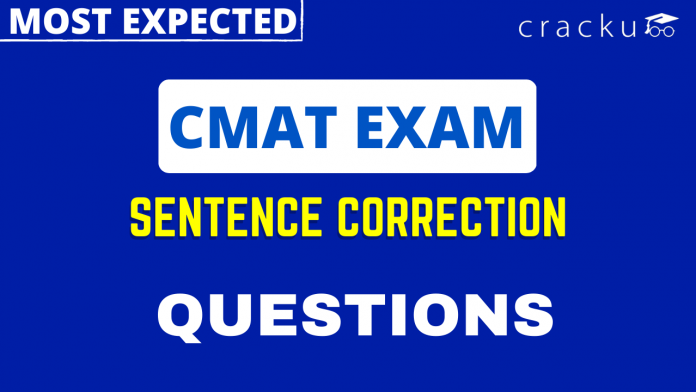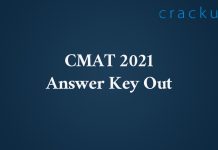CMAT Sentence Correction Questions [Important PDF]
Download CMAT Sentence Correction questions with solutions PDF by Cracku. Practice CMAT solved Sentence Correction Questions paper tests, which are the practice question to have a firm grasp on the Sentence Correction topic in the CMAT exam. Top 20 very Important Sentence Correction Questions for CMAT based on the questions asked in previous exam papers. Click on the link below to download the Sentence Correction Questions for CMAT PDF with detailed solutions.
Download Sentence Correction Questions for CMAT
Enroll to CMAT 2023 Crash Course
Instructions
Read each sentence to find out whether there is any grammatical error in it.
The error, if any, will be in one part of the sentence. The number of that part is the answer. If there is no error, the answer is e:. (Ignore errors of punctuation, if any)
Question 1: She insists (1)/ you stay (2)/ until her husband (3)/ comes home (4)/ No error (5)
a) (1)
b) (2)
c) (3)
d) (4)
e) (5)
1) Answer (B)
Solution:
There is an error in part ‘2’ of the sentence. The correct usage should be “She insists you on staying home until her husband comes” Hence option b is the correct answer.
Question 2: It took me(1)/ almost a hour (2)/ to fill the (3)/ application form (4)/ No error (5)
a) (1)
b) (2)
c) (3)
d) (4)
e) (5)
2) Answer (B)
Solution:
The article used before hour is incorrect. Hour when pronounced makes a vowel sound. Thus, the correct article to be used is ‘an’.
Question 3: I asked the salesman (1) / if I could exchange (2)/ the faulty camera (3)/ with another one (4)/ No error (5)
a) (1)
b) (2)
c) (3)
d) (4)
e) (5)
3) Answer (E)
Solution:
“Another” is an indefinite determiner which is used to refer to an additional person or thing. So the use of “one” after “another” is redundant and has to be removed.
Thus the correct sentence is “I asked the salesman if I could exchange the faulty camera with another.”
Question 4: With a fresh coat (1)/ of paint (2)/ the school can (3)/ look much nice (4)/ No error (5)
a) (1)
b) (2)
c) (3)
d) (4)
e) (5)
4) Answer (D)
Solution:
There is an error in the fourth part of the sentence. The phrase “much nice” should be replaced with “very nice”. Generally “very” is used to modify adjectives.
Question 5: It is more better (1)/ if one of the parents(2)/ stays at home (3)/ to look after the children (4)/ No error(5)
a) (1)
b) (2)
c) (3)
d) (4)
e) (5)
5) Answer (A)
Solution:
The word “better” is in comparative degree. So the word more before it is redundant and has to be removed.
Thus, the correct usage of the sentence is “It is better if one of the parents stays at home to look after the children”.
Instructions
Which of the phrases A, B, C and D given below should replace the phrase given in bold in the following sentences to make the sentence grammatically correct? If the sentence is correct as it is and there is no correction required mark e: i.e. ‘No correction required’ as the answer.
Question 6: Foreign businesses in developing countries have usually problems with lack of infrastructure and rigid laws.
a) usual problems as
b) usually problems on
c) as usual problems like
d) the usual problems of
e) No correction required
6) Answer (D)
Solution:
The usage of ‘with’ with ‘usually’ is incorrect. The correct usage should be ‘the usual problems of’. Hence, the correct answer would be option d.
Question 7: It is difficult to work with him because he is one of those persons who think he is always right.
a) think they are always
b) always thinks he is
c) is always thinking they are
d) always think his
e) No correction required
7) Answer (A)
Solution:
The subject here is ‘one of those persons’, hence the pronoun ‘his’ is incorrectly used. It should be ‘they’ instead of ‘his’
Hence the correct answer is option A
Question 8: Ramesh took charge of the project, within a few days of having appointed
a) having an appointment
b) being appointed
c) after being appointed
d) appointing
e) No correction required
8) Answer (C)
Solution:
The correct usage would be ‘after being appointed’. Hence option C is the correct answer.
Question 9: He wanted nothing else expecting to sleep after a stressful day at work.
a) nothing better than
b) anything else unless
c) nothing but having
d) nothing else than
e) No correction required
9) Answer (A)
Solution:
The correct usage should be ‘nothing else except sleep’ or ‘nothing better than to sleep’. Since the first way does not have ‘to’ , so it is not possible here. Hence among the given choices, only option 1 is correct.
Question 10: During the recession many companies will be forced to lay oil workers.
a) have the force to
b) be forced into
c) forcibly have
d) forcefully
e) No correction required
10) Answer (E)
Solution:
The given sentence is grammatically correct. Hence no change is required.
Instructions
Which of the phrases (A), (B), (C), and (D) given below should replace the phrase given in ‘’bold’’ in the following sentence to make the sentence grammatically meaningful and correct. If the sentence is correct as it is and no correction required, mark (E) as the answer.
Question 11: The law that now stands abolished was a ‘’flawed and discriminatory peace of ‘’ legislation
a) flaw and discrimination of peace of
b) flawed and discriminating peace for
c) flawing and discriminating peace of
d) flawed and discriminatory piece of
e) no correction required
11) Answer (D)
Solution:
Peace means lack of stress. It cannot be used in the passage. Piece means part and fits correctly into the sentence. Hence, D
Question 12: We have already identified areas where landslides are possible and ‘’start evacuation’’ of residents to safer locations
a) starting evacuation
b) started evacuation
c) have started evacuate
d) start evacuating
e) no correction required
12) Answer (B)
Solution:
The sentence is in the present perfect tense. So, the correct grammatical usage is ‘started evacuation’. Option b) is the correct answer.
Question 13: Optimism coupled with ‘’faith in and hopes of’’ future is the key to progress
a) faithfulness in and hopes of
b) faith in and helping of
c) faith in and hopes for
d) faith and hope of
e) no correction required
13) Answer (C)
Solution:
Faith should always be followed by preposition in and future should always be preceded by for. Option C corrects the error.
Question 14: Although he was seen with a drug-peddler, ‘’he is not necessarily himself a drug-peddler’’.
a) it is not necessary that he be himself a drug-peddler
b) he is not necessary to be a drug-peddler himself
c) he was not necessary to be himself a drug-peddler
d) he is not necessarily a drug-peddler himself
e) no correction required
14) Answer (D)
Solution:
Use of adverb necessarily is required with the verb is. Use of adjective necessary is wrong in this context. In the original sentence himself is incorrectly placed that makes the sentence awkward. Right sentence is ‘Although he was seen with a drug-peddler,he is not a drug-peddler necessarily himself’. D is the right answer.
Question 15: We are happy to note that ‘’the use of emission controls was’’ created to reduce air pollution.
a) emission controls were
b) the uses of emission controls were
c) emission controls had
d) emission controls had to be
e) no correction required
15) Answer (A)
Solution:
In the original sentence and in option B, it is implied that the uses were created which is nonsensical. Option C and D are wrong because of the use of past perfect tense which is incorrect in this construction. Right option is A.
Question 16: From time to time, there ‘’have been reports’’ of how children had tried to imitate their favourite hero and landed in trouble.
a) has been report
b) were reports
c) often reported
d) has been reported
e) no correction required
16) Answer (E)
Solution:
The sentence is correct. There is no correction required. Option e) is the correct answer.
Question 17: Because his work as a painter ‘’requires that he use’’ products containing strong chemicals, he has developed skin allergy—
a) required to use
b) requires that he should uses
c) required that he uses
d) requires that he uses
e) no correction required
17) Answer (D)
Solution:
We always use verb+es form when we have singular noun or pronoun. Hence, D
Question 18: They have made a futile attempt of suppressing the truth ‘’and suggest falsehood”
a) Ufor suggestion of falsehood
b) after suggesting falsity
c) and suggesting falsehood
d) in suggestion of falsehood
e) no correction required
18) Answer (C)
Solution:
Parallelism Error. The verbs supress and suggest are to be parallel. So, they should be used in same form. Option C removes that error. Answer is C.
Question 19: Though people ‘’should be right to protest“, it should not be by upsetting the livelihood of others
a) should be righteous in protesting
b) should have right to protest
c) would be right in protest
d) should have been right to protest
e) no correction required
19) Answer (B)
Solution:
The intended meaning of the sentence is people should have a right to protest but this right should not upset other’s livelihoods. Only option B conveys this message, others indicate that people are right when they are protesting. Right answer is B.
Question 20: The newly-wed couple was shocked when it was observed that many people who ‘’had been invited’’, missing.
a) were invited
b) had been invited were
c) had invited were
d) had been invited had been
e) no correction required
20) Answer (B)
Solution:
In the original sentence, who had been invited modifies people. Without the modifier, the sentence would read, ‘The newly-wed couple was shocked when it was observed that many people missing’. This sentence is wrong because of missing ‘were‘ between people and missing. The right sentence should read, The newly-wed couple was shocked when it was observed that many people who had been invited were missing. Right answer is B.
Question 21: Despite considerable achievement in other areas, humans still cannot control weather and ‘’probably never be able’’ to do so.
a) probably not be able
b) perhaps be never have ability
c) probably will never be able
d) probably never be enabled
e) no correction required
21) Answer (C)
Solution:
The sentence is talking about a future event (humans will not be able to control the future). So, the correct grammatical usage is “probably will never be able to do so”. Option c) is the correct answer.
Question 22: What we ‘’have done’’ is from humanity point of view ?
a) have been doing was
b) have done being
c) have done were
d) have been doing were
e) No correction required
22) Answer (A)
Solution:
We use past perfect continuous when we discuss about something that had started beyond past and continued till past. Hence, correct formation is have been doing
Question 23: What is needed now is not mere declarations or promises, but actions – actions to fulfill the ‘’promises already made’’.
a) promise were already made
b) already made promises
c) promises that we make
d) promises which already make
e) no correction required
23) Answer (E)
Solution:
There is no correction needed in the sentence. Option e) is the correct answer.
Question 24: The most important quality a chief executive candidate ‘’should have a’’ noble character.
a) must have a
b) should have to be
c) should be
d) should have is a
e) No correction required
24) Answer (D)
Solution:
The word ‘is’ is missing in the sentence. The sentence should read: The most important quality that a chief executive candidate should have is a noble character.
Option d) is the correct answer.
Question 25: It is now well-known that the ‘’world response to’’ the Asian tsunami disaster with an outpouring of generosity.
a) world responded to
b) world’s response to
c) world had a response
d) world responding for
e) No correction required
25) Answer (A)
Solution:
The event being talked about is in the past tense. So, the correct usage is ‘world responded to’. Option a) is the correct answer.





